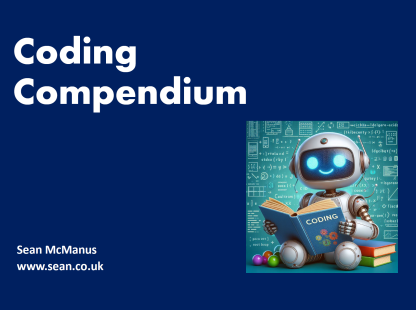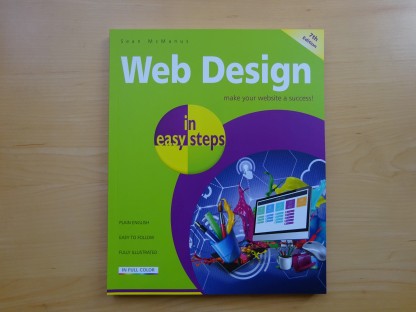
Coding Compendium
A free 100-page ebook collecting my projects and tutorials for Raspberry Pi, micro:bit, Scratch and Python. Simply join my newsletter to download it.
Journalism consistently features in surveys of what jobs graduates would most like to have. You'll probably need luck and persistence, but you'll need a reasonable dose of those in doing the job too. And you can do a lot to help good luck along. I don't think it's harder than getting a job as a teacher or engineer. If you want to be a big name and front the TV news or hit the broadsheet cover pages, it's going to take more work. But you'll probably have to start at the same place.
A word of caution here: a lot of people want to be journalists, proofreaders or photographers and there's a small industry in companies that exploit this by selling training that isn't widely respected in the industry. That's not to say it won't help you, just that you might not get value for money and might find that the benefits of the training are oversold to you. Correspondence courses are a particular problem.
If you're choosing a degree, it might make most sense to choose a non-media degree. That gives you a specialism to write about and you can always pick up the media training later, either by doing a course (such as an NCTJ recognised journalism course) or training on the job. Most major publishers look to graduates to fill their entry-level positions.
There are a lot of companies offering on the job training. The deal here is usually that they exploit you for the work, and you exploit them for the training. Not much money changes hands. As long as they give you a real chance to learn quickly, they're a cheaper way to start than paying for a course. You might need to aggressively pursue opportunities to try new things.
No certificates will help you as much as experience, so start writing as soon as you have an opportunity.
By doing it. Obviously editors of newsstand bestsellers won't be too chuffed if you waste their time pitching half-prepared ideas to them (and the problem when you're starting out is that you don't know what you don't know), but a lot of special interest publications encourage new writers. If you've got a hobby, you can often write for the publications that serve that hobby to start building up a portfolio. If there's an event or trade show locally, you might be able to cover it for the national or international business or trade press because they can't send anyone else. You can find new magazines using the Writers & Artists Yearbook (in most libraries, and you can buy it from here). The most definitive guide is Brad, which you might have to travel to a business library for.
Once you have a piece published, you're able to work your way up by sending copies of that with article proposals to editors on slightly bigger and/or more prestigious publications until you're where you want to be.
You can also write for local freesheets (which often won't pay, but will give you a printed credit), fanzines and websites. If there isn't an opportunity to write about your pet subject, think of ways to create an opening or ways you can learn to write for a new market.
Two tips on starting out in writing:
Music journalism is badly paid, so it's probably best seen as one subject you write about as a freelancer rather than the whole basis for a career. As a guide, market-leading music publications pay about half the NUJ rate. Working freelance also gives you the opportunity to choose what to write about. Music journalism offers the best opportunities to start out, because you can start your own fanzine about a band. But it's also one of the most fiercely competitive areas of journalism.
The good thing about music journalism is that you don't need to compete on experience so much: if you can send some articles that fit a magazine's style and are fun to read, you stand a chance of getting in. If you're good, they'll want to take you on. If you're not ready yet, there aren't any training opportunities, it's just a case of trying again. It can be helpful to specialise in a type of music when writing for magazines, although they'll all expect some awareness of the greats.
(I haven't done much reviewing or interviews, doing a lot more music technology writing. This is less competitive than writing reviews for the NME or suchlike, I know).
You can already start gathering and demonstrating the skills you'll need as a journalist, however far away you are from applying for jobs. Increasingly journalists need to be multi-skilled. Here are some ideas for what you can easily do now:
© Sean McManus. All rights reserved.
Visit www.sean.co.uk for free chapters from Sean's coding books (including Mission Python, Scratch Programming in Easy Steps and Coder Academy) and more!

A free 100-page ebook collecting my projects and tutorials for Raspberry Pi, micro:bit, Scratch and Python. Simply join my newsletter to download it.

Web Design in Easy Steps, now in its 7th Edition, shows you how to make effective websites that work on any device.

Power up your Microsoft Excel skills with this powerful pocket-sized book of tips that will save you time and help you learn more from your spreadsheets.

This book, now fully updated for Scratch 3, will take you from the basics of the Scratch language into the depths of its more advanced features. A great way to start programming.

Code a space adventure game in this Python programming book published by No Starch Press.

Discover how to make 3D games, create mazes, build a drum machine, make a game with cartoon animals and more!